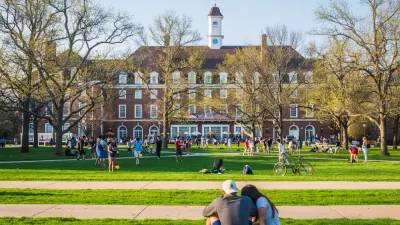Richard Perez-Pena reports on the new frontier in the rush to monetize publicly owned resources - the college parking lot.
As state universities try to fill in gaps left by shrinking government support, Ohio State University is on the cutting edge. Following its recent sale of $500 million in 100-year bonds (a first for a public university) and a $25 million exclusive deal for campus A.T.M.'s, Ohio State's latest fund-raising effort echoes a much-maligned parking meter lease concession sold by the City of Chicago.
According to Perez-Pena, "a private bidder has offered $483 million in a lump sum for a lease to operate university parking facilities for 50 years."
"Joseph A. Alutto, the provost, noted that state aid now accounted for only 7 percent of the university's $5 billion annual budget, and that the federal government's budget troubles could lead to even deeper cuts."
"We need to address an increasingly uncertain environment and set some money aside," he said. "We can't go on raising tuition forever. We're looking at all our assets and asking, ‘If they're nonessential assets, how can we turn them into revenue?'"
Perez-Pena notes that, "The plan has stirred controversy
on a campus where, according to the school, about 100,000 students and
employees park each day. Responding to concerns, the university has
included in the deal limits on price increases, and flexibility to
increase parking supply. "
FULL STORY: Ohio State Gets $483 Million Bid for Parking Lease

Trump Administration Could Effectively End Housing Voucher Program
Federal officials are eyeing major cuts to the Section 8 program that helps millions of low-income households pay rent.

Planetizen Federal Action Tracker
A weekly monitor of how Trump’s orders and actions are impacting planners and planning in America.

Ken Jennings Launches Transit Web Series
The Jeopardy champ wants you to ride public transit.

NYC Open Streets Organizers Call for City Support
The number of open streets projects has dropped year after year as volunteer groups struggle to fund and staff them.

Crime Continues to Drop on Philly, San Francisco Transit Systems
SEPTA and BART both saw significant declines in violent crime in the first quarter of 2025.

How South LA Green Spaces Power Community Health and Hope
Green spaces like South L.A. Wetlands Park are helping South Los Angeles residents promote healthy lifestyles, build community, and advocate for improvements that reflect local needs in historically underserved neighborhoods.
Urban Design for Planners 1: Software Tools
This six-course series explores essential urban design concepts using open source software and equips planners with the tools they need to participate fully in the urban design process.
Planning for Universal Design
Learn the tools for implementing Universal Design in planning regulations.
Heyer Gruel & Associates PA
Ada County Highway District
Institute for Housing and Urban Development Studies (IHS)
City of Grandview
Harvard GSD Executive Education
Toledo-Lucas County Plan Commissions
Salt Lake City
NYU Wagner Graduate School of Public Service



























